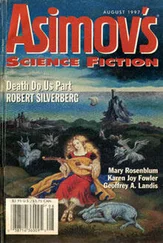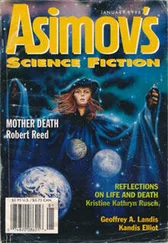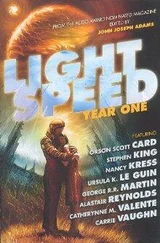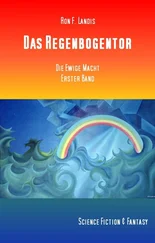She knew that he would, in fact, stop for her if he had to; Ryan was not about to lose one of the crew. But she had no intention of falling off. She had won. “Got it, commandant,” she said. “Falling off not allowed.”
“Damn kids gonna want to ride up there next, I know it,” he muttered.
As the rockhopper started up, it lurched, and then swayed from one side to the other. “Yikes!” she said.
The rockhopper stopped abruptly, and she had to grab suddenly to stay seated.
“You okay up there?”
“No problem,” she said. “I’m fine. Go ahead.” She kept a solid grip on the handhold this time. Once she got used to the side-to-side swaying and found her balance, it really wasn’t bad. No worse than balancing on skis or a skateboard, and far easier than the time she had tried riding on a camel.
Now, this is more like it, she thought. Riding across Mars in style. Plenty of room, and the greatest view on the planet. Best seat on the bus.
“Yahoo!” she shouted. She had made sure to turn her voice-activated microphone off before she shouted, and there was no reply, not even an echo. There should have been an echo, it would have completed the effect.
“Yahoo!”
Nobody had told Estrela where she was being taken or tried to explain what was happening, nor did she ask any questions. Estrela already knew that her comfort, health, or opinions were of no interest to those who had her in their custody. She kept alert for a chance to dart away, to disappear into the shadows of the city. But she had been handcuffed—although she’d not been accused of a crime—and there were no clear opportunities. After the brief reprieve, she thought, she would be taken farther away and shot.
Instead, they put her on an ancient bus, and without explanation she was driven what had seemed like hundreds of kilometers inland. She had huddled in the corner, hissing and baring her teeth when anybody got near her. She had never been inside a motor vehicle before; the experience made her queasy, and if she had not been fairly faint with hunger, she thought that she would certainly have thrown up.
The School of the Beneficent Jesus of the South was a rude collection of tin-roofed cinder block huts and dirt pathways. She didn’t have any clear image in her mind of what a Father Tomé would look like, but the bald, smiling, roly-poly Anglo man in a faded Ipanema Beach Club T-shirt did not fit any of her expectations.
“Oh, my,” he said. He looked at the driver, shook his head, and then looked pointedly at the plastic handcuffs.
The driver’s hands were unexpectedly gentle as he cut the handcuff away from her. “She’s all yours now,” the man said, and went back to his bus.
She was ready to bolt now, but the wide-open spaces and the mountains disoriented her. She had no idea where the city was, if it was near or far. She had no idea of what was safe, or where she could hide, or what she could eat, or who she could trust.
Father Tomé smiled at her and held out his hand. In it was something, a little fur-covered purple object that, after she’d stared at it for a minute, she recognized as some sort of an animal, a stuffed animal. A lizard, no, a dinosaur. A purple stuffed dinosaur.
“Here, my frightened little avocado, this is for you,” he said. “Take it. It’s yours.”
It looked forlorn in his huge hand.
She wanted it. She snatched it out of his hand, hugged it to her breast and began to cry.
“Poor little avocado,” he said. “Welcome to Jesus do Sul. You are safe here.”
She was turned over to the ministrations of three laughing girls, who were not really much older than she was, although in their self-confidence they seemed to be much older and more experienced. “I am Maria Bonita,” the first one told her. “I am Maria da Glória,” the second girl said. “I am Maria Araujo,” the third one said. “The Father calls us the three Marias,” they said, all three together, and they exchanged glances and nodded solemnly at each other, secure in their identities.
They stripped her—she fought—and plunged her into hot water—she shrieked and flailed. Then they held her and scrubbed her firmly with huge wooden brushes, and she fought again. Finally they soaked her hair with kerosene. She screwed her eyes shut and held her breath, terrified, waiting for the flare of a match, and when they rubbed the kerosene briskly into her scalp, it felt as if her head was on fire, but a cold fire, chilling and burning at the same time. But the fire did not spread, and all they did was to wash it away again, covering the sharp odor with some bubbly soap that smelled like exotic flowers. Finally they dried her with huge fluffy towels. They gave her back the little stuffed dinosaur, which she clutched to her chest, and then dressed her in pajamas that were two sizes too large. It was the cleanest clothing she’d ever worn.
She didn’t even know who she was. Not the starved street child. Not anybody she knew. She didn’t know who she was, and there was no point in fighting any more.
“Why, she’s beautiful,” a voice said. “Father Tomé, your little waif is no avocado at all. She is an orchid, precious and beautiful.”
She had been called many things in her life, but never beautiful. She peeked out from between her fingers to see who had said it.
A young man stood next to Father Tomé, a mestico , tall and slender with dark skin and dark eyes and a lion’s mane of dark hair. He was smiling at her with a smile that lit up the very air and set her heart to glowing with an ache like a hunger she could never name. She ventured a smile of her own, tentative and small, and he raised his hand and took a half step backward as if her smile had the force of a sudden gale.
“I am João,” he said, his voice rich and deep with the familiar street accent of the cariocas . “Ah, my beautiful little orchid, I can see that you will break many, many hearts, but you will never break mine.”
Wherever he goes, she told herself, I will follow in his shadow.
Following in João’s footsteps, she discovered, would not be easy. He had himself been a student of the Jesus do Sul. He had excelled in his education and, at age fifteen, had already been accepted at the College of Saint Adelbert, far away in North America, to study for a degree in geology. The Holy Order of Saint Anselm, Father Tomé’s order, was paying his tuition; the School of Jesus do Sul was itself assisting him with the expenses of travel. “The best of my children ever to leave Jesus do Sul,” Father Tomé said. “How could we do otherwise than to help him?” In return, João would return to Brazil every summer and assist with the teaching.
Father Tomé, she discovered, called all of his wards avocado; she never learned why. He was a communist who talked fiercely of overthrowing the government of Brazil and redistributing the country’s wealth to the poor. What she knew of economics was that the rich people had huge houses and servants and drove around in chauffeured limousines with darkened windows and ate ice cream whenever they felt like it. The poor people had nothing and were invisible.
She was going to be a rich person, and one day eat ice cream in her own automobile.
No, Father Tomé told her, that’s wrong, my clever little avocado. You should learn to share.
No, she told him. She would be rich.
Father Tomé smiled. “Then you will have to learn. You will have to learn manners, and how to dress, and how to behave nicely, and how to have a nice mouth that does not swear. Sister Isabel will teach you.”
I will, she promised herself. I will. I will!
In later days, she rarely saw Father Tomé. There were always too many children in the escola , for Father Tomé could never turn one away, and the escola was as crowded with tossed-together shacks as any favela shantytown. The teacher who assisted most with the street children, the new ones who needed instruction in even the most simple matters of grammar and etiquette, was Sister Isabel. She was four feet tall and at least as wide, quite simply the ugliest woman Estrela had ever seen. Sister Isabel had a boundless patience and a deep love for her charges. “You shall be a little lady,” she told Estrela. “Don’t you want to be beautiful? Don’t you want people to love you? Then you must learn to talk properly.” She had a heart as big as Brazil. Estrela felt safe with sister Isabel.
Читать дальше












